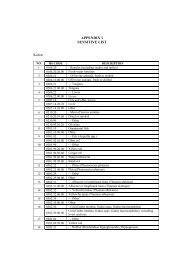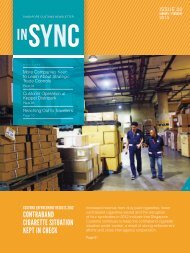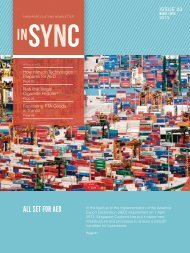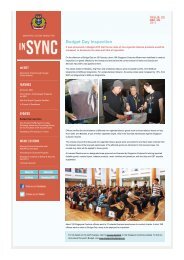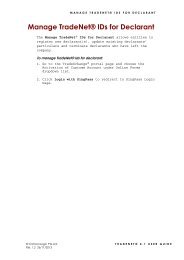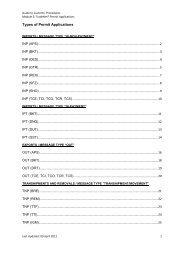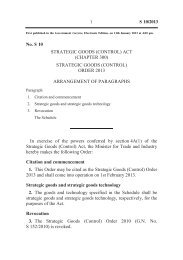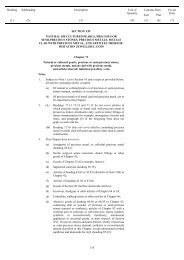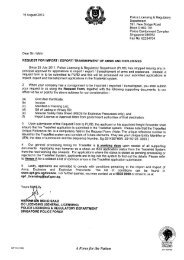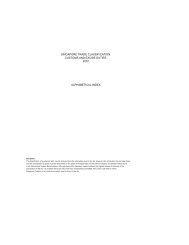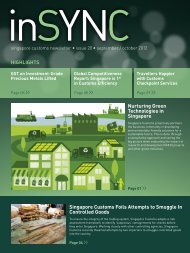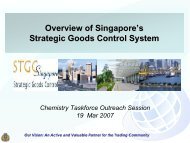Download PDF - Singapore Customs
Download PDF - Singapore Customs
Download PDF - Singapore Customs
Create successful ePaper yourself
Turn your PDF publications into a flip-book with our unique Google optimized e-Paper software.
inSYNC<br />
FEATURES<br />
I<br />
singapore customs newsletter • issue 17 • march / april 2012<br />
HIGHLIGHTS<br />
TradeFIRST Unlocks<br />
Business Potential<br />
for Sankyu<br />
Extension of<br />
Temporary Import Period<br />
Protecting Intellectual<br />
Property Rights<br />
Page 06 Page 08 Page 10<br />
New Licence Introduced<br />
for Microbreweries<br />
<strong>Singapore</strong>’s microbreweries will benefit<br />
from a new licence type introduced<br />
specifically to cater to their business<br />
model, significantly reducing their<br />
business costs.<br />
Photo: Paulaner Bräuhaus<br />
Page 01<br />
New Tiers for the Licensed Warehouse Scheme<br />
The Licensed Warehouse Scheme has been revamped to comprise three tiers from<br />
1 April 2012. Licensees can now enjoy varying degrees of facilitation according to<br />
their TradeFIRST assessment band.<br />
Photo: YCH Group<br />
Page 04
II<br />
CONTENTS<br />
FEATURES<br />
inSIGHT<br />
SUPPORTING ENTERPRISE, FACILITATING BUSINESSES<br />
As the guardian of the country’s trade, <strong>Singapore</strong> <strong>Customs</strong><br />
is charged with assuring the integrity of <strong>Singapore</strong>’s external<br />
trading system through regulation. But the objective of<br />
regulation is precisely to facilitate trade, not suffocate it<br />
with red tape.<br />
The pro-enterprise bent of our regulatory role is evident in<br />
two new schemes introduced on 1 April 2012. <strong>Singapore</strong>’s nine<br />
microbreweries stand to save $34,800 a year each in licence<br />
fees with the introduction of a new licence type for breweries<br />
producing less than 1.8 million litres of beer or stout. This<br />
move was in response to feedback from the industry.<br />
Instead of a standard licence for warehouses storing imported<br />
dutiable goods, there are now three tiers of licences, tied to<br />
the TradeFIRST bands. Companies in the higher TradeFIRST<br />
bands are entitled to higher licensed warehouse tiers, with<br />
additional facilitation that lowers business costs and provides<br />
greater flexibility.<br />
The proof of the pudding is in the eating and we showcase<br />
Sankyu, a logistics player which has leveraged its promotion<br />
to the TradeFIRST Premium band in several different ways.<br />
Also since April 2012, goods imported under the Temporary<br />
Import Scheme can remain in the country for six months<br />
without the payment of duty or Goods and Services Tax – up<br />
from three months previously – providing greater flexibility<br />
to traders.<br />
PATRICIA BAY<br />
Editor<br />
01<br />
04<br />
06<br />
08<br />
09<br />
10<br />
11<br />
12<br />
13<br />
Features<br />
New Licence Introduced<br />
for Microbreweries<br />
New Tiers for the<br />
Licensed Warehouse Scheme<br />
TradeFIRST Unlocks<br />
Business Potential for Sankyu<br />
Updates<br />
Extension of<br />
Temporary Import Period<br />
Strengthening International Ties,<br />
Exchanging Experiences<br />
Protecting Intellectual Property Rights<br />
Declaring Agent Fined for<br />
Naming False Importer of Goods<br />
Inside <strong>Customs</strong><br />
Breaking Ground for<br />
<strong>Singapore</strong> <strong>Customs</strong> Export Scanning Station<br />
Training Calendar / Event Highlights<br />
DESIGN BY<br />
Green House Design + Communications<br />
Please let us know what you think of inSYNC.<br />
We welcome your ideas on what you would like to<br />
see and how we can do better. Write in to the Editor<br />
at customs_media@customs.gov.sg<br />
To read, download or subscribe to the online edition<br />
of inSYNC, please visit www.customs.gov.sg/insync<br />
http://www.facebook.com/<strong>Singapore</strong><strong>Customs</strong><br />
InSYNC is a publication of <strong>Singapore</strong> <strong>Customs</strong>. Copyright of the<br />
materials contained in this publication belongs to <strong>Singapore</strong> <strong>Customs</strong>.<br />
Nothing in here shall be reproduced in whole or in part without<br />
prior written consent of <strong>Singapore</strong> <strong>Customs</strong>. All rights reserved.<br />
All information is correct at time of publication.
FEATURES 01<br />
New Licence Introduced<br />
for Microbreweries<br />
<strong>Singapore</strong>’s microbreweries will benefit from a<br />
new licence type introduced specifically to cater<br />
to their business model, significantly reducing<br />
their business costs.<br />
Photo: Paulaner Bräuhaus
02<br />
FEATURES<br />
Photo: Reddot BrewHouse<br />
Photo: Brewerkz<br />
From 1 April 2012, a licence for<br />
breweries producing less than<br />
1.8 million litres of beer or stout<br />
will incur a fee of $8,400 annually.<br />
Previously, microbreweries paid the<br />
same fee as large-scale breweries<br />
– $43,200 annually. The new lower<br />
fee tier for microbreweries comes<br />
on the back of a review by <strong>Singapore</strong><br />
<strong>Customs</strong> of the effort involved in<br />
administering the licence for smallerscale<br />
breweries and benchmarking with<br />
international practices.<br />
<strong>Singapore</strong>’s nine microbreweries were<br />
jubilant. Said the General Manager of<br />
Paulaner Bräuhaus <strong>Singapore</strong> Alexander<br />
Buchner: “We gladly accepted the<br />
review as it will help us to ease our<br />
cost structure and have a more feasible<br />
operation in the long-term.”<br />
Added the Director of Reddot BrewHouse<br />
and brewmaster Ernest Ng: “The new<br />
licence type is more equitable. It will<br />
save microbreweries at least $34,800<br />
per year, which could be better spent on<br />
R&D to improve our performance and<br />
quality of our products.”<br />
Besides welcoming the cost savings,<br />
brewer and owner of AdstraGold<br />
Microbrewery Chia Shee Yap was<br />
gratified by <strong>Singapore</strong> <strong>Customs</strong>’<br />
responsiveness to sentiment among<br />
microbrewery players. He said:<br />
“AdstraGold is absolutely delighted<br />
and pleased that <strong>Customs</strong> has taken<br />
a serious view of the feedback from<br />
the microbrewery industry, and has<br />
reclassified microbrewery and factory<br />
brewery licence fees separately.”<br />
The manufacture of dutiable goods such<br />
as alcohol requires a licence under the<br />
<strong>Customs</strong> Act. Hence microbreweries,<br />
which carry out fermentation and<br />
manufacturing of ale, beer, stout or<br />
porter similar to the operations of<br />
a full-scale brewery, had been duly<br />
licensed under the same category for<br />
the production of alcohol.
FEATURES 03<br />
Photo: AdstraGold Microbrewery<br />
However, this licence was conceptualised<br />
for large manufacturing plants, whose<br />
operations differ from microbreweries.<br />
The production volume of a microbrewery<br />
is significantly lower. A full-scale<br />
brewery can produce close to 120<br />
million litres of beer a year while a<br />
microbrewery’s production is typically<br />
less than half a million litres a year.<br />
Nevertheless, <strong>Singapore</strong> <strong>Customs</strong> has<br />
used the generally accepted maximum<br />
quantum of 15,000 barrels a year – the<br />
equivalent of 1.8 million litres – to define<br />
a microbrewery.<br />
The manufacturing processes of a<br />
microbrewery are also simpler. The<br />
set-up of a microbrewery is one of a<br />
closed-loop system from start of the<br />
fermentation process to the point of<br />
excise duty payment, when the final<br />
fermented product is transferred to<br />
the dispensing tank ready for direct<br />
serving. Beer brewed by a microbrewery<br />
is generally served at its own pub<br />
and restaurant.<br />
In a full-scale brewery however, excise<br />
duty payment takes place only after<br />
the finished product has been bottled<br />
or canned, sorted and packed, ready<br />
for local release. The products could<br />
also be exported. Additional resources<br />
are also required for monitoring and<br />
managing a separate licensed storage<br />
area and a bottling production line, and<br />
the processing of remissions of duty and<br />
Goods and Services Tax for breakages<br />
and incorrect declarations due to the<br />
greater volume of beverage produced.<br />
Microbreweries therefore pose a<br />
lower revenue risk and require less<br />
administrative effort. Hence it would<br />
be equitable to charge them a lower<br />
licence fee.<br />
It is also anticipated that introducing<br />
the new licence type will boost the craft<br />
brewing scene in <strong>Singapore</strong>. Explained<br />
Mr Devin Kimble, Managing Director<br />
of MENU Food & Drinks Group, which<br />
operates Brewerkz Restaurant &<br />
Microbrewery: “It is wonderful that the<br />
economic and job creation benefits of<br />
microbreweries for the local economy<br />
have been acknowledged by making<br />
it easier particularly for start-up<br />
microbrewers to get into and stay<br />
in business.<br />
Without a doubt the new licence will<br />
expand the microbrewing industry in<br />
<strong>Singapore</strong>. While some might view this<br />
as increased competition for incumbent<br />
brewers, we at Brewerkz feel that it will<br />
serve to grow demand for greater beer<br />
diversity and that will greatly benefit<br />
all of us. Using the United States as an<br />
example, the craft brewing part of the<br />
beer industry is growing at a double digit<br />
clip while overall demand is falling. By<br />
making it less expensive to operate a<br />
brewery in <strong>Singapore</strong>, there should be a<br />
similar renaissance here.”
04<br />
FEATURES<br />
New Tiers for the<br />
Licensed Warehouse Scheme<br />
The Licensed Warehouse Scheme has been revamped<br />
to comprise three tiers from 1 April 2012. Licensees can<br />
now enjoy varying degrees of facilitation according to<br />
their TradeFIRST assessment band.<br />
CORRELATING FACILITATION WITH<br />
INTERNAL CONTROLS<br />
In line with the principle of according<br />
different levels of facilitation to<br />
companies based on their level of<br />
internal controls and compliance<br />
under <strong>Singapore</strong> <strong>Customs</strong>’ integrated<br />
TradeFIRST assessment framework,<br />
Licensed Warehouse licensees in the<br />
higher TradeFIRST bands are awarded<br />
higher tier licences.<br />
Those in the Premium and Enhanced<br />
bands are awarded the Type III licence,<br />
while those in the Intermediate band and<br />
the Standard band are awarded the Type<br />
II and Type I licences respectively.<br />
Previously, there was only one type of<br />
licence under the Licensed Warehouse<br />
Scheme for traders to store imported<br />
dutiable goods such as liquors, tobacco<br />
products and dutiable motor vehicles in<br />
a licensed area with the duty and Goods<br />
and Services Tax payable suspended<br />
pending re-export or local release of<br />
the goods.<br />
Today, there are three tiers of licences<br />
under the scheme – Type I, which<br />
is equivalent to the former licence,<br />
and Types II and III, where Licensed<br />
Warehouse licensees are granted<br />
Photo: YCH Group<br />
more relaxed regulatory controls and<br />
permit requirements.<br />
For instance, Type II licensees pay a<br />
single annual licence fee, instead of<br />
separate fees, for the storage of both<br />
liquor/tobacco products and motor<br />
vehicles. On top of the facilitation<br />
accorded to Type II licensees, Type III<br />
licensees will also be allowed to store<br />
both duty-suspended and duty-paid<br />
goods within the licensed area, and<br />
operate multiple licensed locations<br />
under a single licence and incur a<br />
single licence fee.<br />
The tiering of the Licensed Warehouse<br />
scheme was hailed by Mr Desmond<br />
Chan, Menlo Worldwide Logistics’<br />
Managing Director for South Asia.<br />
“Menlo supports the TradeFIRST<br />
initiative and believes Type III licensing –<br />
the highest of the three tiers – will bring<br />
welcome improvements in flexibility and<br />
reduced operating costs for qualified<br />
logistics providers,” he said.<br />
Menlo offers a broad range of logistics<br />
services in <strong>Singapore</strong>, ranging from<br />
bonded multi-client warehousing to<br />
open yard storage for the automotive,<br />
wine and spirits, consumer and chemical<br />
industries. With the Type III licence,<br />
it will enjoy substantial savings in<br />
licence fees as a single licence is all<br />
that is needed for the various licensed<br />
premises it operates and the different
FEATURES 05<br />
types of dutiable goods it handles.<br />
The company will also benefit from<br />
increased flexibility for the temporary<br />
removal of motor vehicles and alcoholic<br />
beverages from its licensed premises for<br />
approved exhibitions.<br />
By rewarding TradeFIRST compliant<br />
companies with more facilitation,<br />
<strong>Singapore</strong> <strong>Customs</strong> aims for a win-win<br />
outcome with licensees. Said<br />
Mr Chan: “<strong>Singapore</strong> <strong>Customs</strong> is to<br />
be commended for its forward-thinking<br />
approach to this licensing scheme.<br />
It is proving to be cost-effective and<br />
will help streamline trade practices<br />
while encouraging logistics companies<br />
to enhance their systems and<br />
processes for better compliance and<br />
efficient operations.”<br />
The advantages of a Type III licence to<br />
YCH Group were also recognised by its<br />
<strong>Singapore</strong> General Manager Joshua<br />
Lee. “Benefits such as being able to<br />
batch and expedite permit declaration<br />
as well as flexibility to better manage<br />
storage space will enhance our efforts<br />
in continuous innovation and supply<br />
chain optimisation for our world-class<br />
customers,” he said.<br />
An added plus of the three-tiered<br />
Licensed Warehouse Scheme is a<br />
new tiered principle of supervision for<br />
container stuffing operations. Licensees<br />
will no longer have to apply to <strong>Singapore</strong><br />
<strong>Customs</strong> for supervision of stuffing<br />
operations, but may still be subject to<br />
checks by the authority. In accordance<br />
with risk management principles,<br />
Type III licensees would be subject to<br />
fewer checks than Type I and Type II<br />
licensees. This is yet another component<br />
of <strong>Singapore</strong> <strong>Customs</strong>’ goal of tailoring<br />
facilitation and requirements according<br />
to companies’ compliance levels.<br />
TIERED LICENSED WAREHOUSE SCHEME – BENEFITS AT A GLANCE<br />
BENEFITS TYPE I TYPE II TYPE III<br />
Physical demarcation of<br />
licensed area<br />
Storage of other goods<br />
together with the<br />
imported duty and GST<br />
suspended goods within<br />
the licensed area<br />
Take out a consolidated<br />
Duty & GST Payment<br />
Permit to cover local<br />
release of goods from the<br />
licensed premises on a<br />
weekly basis<br />
Number of locations<br />
allowed per licence<br />
Storage of both tobacco/<br />
liquor products and<br />
motor vehicles under a<br />
single licence<br />
Temporary removal of<br />
alcoholic beverages from<br />
licensed premises for<br />
approved exhibitions<br />
Temporary removal of<br />
motor vehicles from<br />
licensed premises for<br />
approved exhibitions<br />
Yes Yes No<br />
No No Yes<br />
No No Yes<br />
One One Multiple<br />
No Yes Yes<br />
Wines only<br />
Up to one<br />
month<br />
All<br />
alcoholic<br />
beverages<br />
Up to three<br />
months<br />
All alcoholic<br />
beverages<br />
Up to three months.<br />
Modifications to the<br />
motor vehicles can<br />
also be carried out<br />
within the licensed<br />
premises.<br />
For more information about the tiered Licensed Warehouse Scheme, please refer to <strong>Customs</strong> Schemes & Licences under<br />
‘Traders & Businesses’ at www.customs.gov.sg<br />
For details on the revised container stuffing procedures under the tiered Licensed Warehouse Scheme, please refer to<br />
Circular No. 05/2012 at www.customs.gov.sg
06<br />
FEATURES<br />
TradeFIRST Unlocks<br />
Business Potential<br />
for Sankyu<br />
Advancing from the Enhanced to the<br />
Premium band of <strong>Singapore</strong> <strong>Customs</strong>’ integrated<br />
TradeFIRST assessment framework continues<br />
to help Sankyu’s bottom line.<br />
Japanese logistics company Sankyu<br />
(<strong>Singapore</strong>) was always aware of the<br />
benefits of being in the Premium band of<br />
the TradeFIRST assessment framework<br />
and quickly leveraged it when business<br />
demands required it to obtain additional<br />
licences from <strong>Singapore</strong> <strong>Customs</strong>.<br />
The company, which was originally<br />
on the TradeFIRST Enhanced band,<br />
applied for STP (Secure Trade<br />
Partnership) Plus certification in<br />
November 2011. It was already STPaccredited<br />
and also held a Zero-GST<br />
(ZGS) Warehouse Type III Licence.<br />
An STP Plus accreditation would enable<br />
Sankyu to take advantage of <strong>Singapore</strong>’s<br />
Mutual Recognition Arrangement with<br />
Japan. Sankyu’s exports would enjoy a<br />
higher level of facilitation during customs<br />
clearance in Japan, providing better<br />
predictability for the movement of its<br />
goods, particularly for time-sensitive<br />
exports, and savings in cost which would<br />
otherwise be incurred due to delays.<br />
“We already fulfilled about 70 per<br />
cent of the STP Plus criteria. We had<br />
installed a CCTV system, the main<br />
investment required. So the cost was not<br />
significant. Upgrading was mainly for<br />
our manpower procedures. We also had<br />
to get our suppliers to comply with the<br />
requirements, which indirectly benefited<br />
them,” said Sankyu’s Director of Logistics<br />
Lewis Kiew.
FEATURES 07<br />
Helping him was Sankyu’s <strong>Singapore</strong><br />
<strong>Customs</strong> account manager Chua<br />
Nam Hiong. He advised Sankyu<br />
on the identified areas for security<br />
improvements for its business partners,<br />
conveyances, cargoes and risk<br />
assessment, and shared with them the<br />
best practices in supply chain security.<br />
“We had several rounds of meetings.<br />
<strong>Singapore</strong> <strong>Customs</strong> is always very proactive<br />
and cooperative. We can consult<br />
our account manager on the things<br />
we are in doubt about and we will get<br />
a timely response. It is a very helpful<br />
system that is not in operation in any<br />
other country I know,” commented<br />
Mr Kiew.<br />
Sankyu successfully attained the STP<br />
Plus certification in February 2012. In the<br />
process, it was also reassessed under<br />
the TradeFIRST framework and was<br />
upgraded to the Premium band.<br />
MEETING NEW BUSINESS NEEDS<br />
Subsequently, Sankyu had to find a use<br />
for its chill room because a key customer<br />
had given it up. It was able to secure<br />
a Japanese customer looking to store<br />
wine at low temperatures. However to<br />
store dutiable liquors, Sankyu required a<br />
licence to operate a Licensed Warehouse,<br />
which it did not have.<br />
“We already had the business, so we<br />
outsourced it to one of our suppliers<br />
while we set about obtaining the<br />
necessary licence,” said Mr Kiew. Thanks<br />
to the additional facilitation available<br />
to Premium companies, Sankyu was<br />
granted the Apex Licence which included<br />
the Licensed Warehouse scheme.<br />
Being in the Premium band has brought<br />
Sankyu other benefits as well. Immediate<br />
payoffs include reduced licensing fees<br />
for a single Apex Licence as compared<br />
to separate licensing fees for a Licensed<br />
Warehouse and a ZGS Warehouse, and<br />
a waiver of the requirement to lodge a<br />
banker’s guarantee for the operation of a<br />
Licensed Warehouse.<br />
Sankyu is also applying for a Container<br />
Freight Warehouse Licence to unstuff<br />
consolidated containers outside the free<br />
trade zone. “At present, we have to rent<br />
a fixed area at Keppel Distripark. As<br />
our volume is not large enough, we are<br />
running at a loss every month. Although<br />
it is less convenient, a licence to unstuff<br />
at our premises will allow us to maintain<br />
our consolidation services,” said Mr Kiew.<br />
Sankyu has seen obvious business<br />
benefits from attaining the STP Plus<br />
certification and scaling the TradeFIRST<br />
ladder. “Our facilitation status makes us a<br />
cut above the rest. It enhances customer<br />
confidence in our services and helps us to<br />
win new projects,” noted Mr Kiew.<br />
“Since obtaining the Premium band, we<br />
have benefited from cost savings and our<br />
business has increased. We have also had<br />
the opportunity to expand our business<br />
into the area of storing wine. We can<br />
build more chill rooms if we get more<br />
customers,” he added.<br />
Sanyku is an international logistics<br />
player with a strong presence<br />
in China and Southeast Asia.<br />
Its <strong>Singapore</strong> subsidiary was<br />
established in 1971 and currently<br />
employs 800 staff. It specialises in:<br />
International<br />
freight forwarding<br />
Import and export<br />
forwarding<br />
International<br />
parcel service<br />
Warehousing, distribution<br />
and land transportation<br />
Heavy<br />
haulage<br />
On-site<br />
logistics service<br />
For more information on the<br />
TradeFIRST framework and the<br />
schemes and facilitations under<br />
its five bands, please refer to<br />
www.customs.gov.sg under<br />
TradeFIRST.<br />
Photos courtesy of Sanyku (<strong>Singapore</strong>)
08<br />
UPDATES<br />
Extension of<br />
Temporary Import Period<br />
Since 1 April 2012, the temporary import relief period has been doubled from<br />
three months to six months.<br />
Aimed at providing businesses with<br />
greater flexibility, the change to<br />
the Temporary Import Scheme was<br />
announced as part of the <strong>Singapore</strong><br />
Budget 2012.<br />
The Temporary Import Scheme now<br />
allows goods, with the exception of liquor<br />
and tobacco products, to be imported<br />
without payment of duty or Goods and<br />
Services Tax (GST) if they are to be re-<br />
exported within six months from the date<br />
of importation.<br />
Such goods must be imported for<br />
approved purposes such as exhibitions,<br />
fairs, auctions, repairs, stage<br />
performances, testing, experiments<br />
or demonstration.<br />
The duty and GST will become payable if<br />
the goods are not re-exported after the<br />
expiry of the six-month period.<br />
For more information about<br />
the Temporary Import Scheme,<br />
please refer to <strong>Customs</strong> Schemes<br />
& Licences under ‘Traders &<br />
Businesses’ at www.customs.gov.sg<br />
For details on the extension of the<br />
temporary import relief period,<br />
please refer to Circular No.03/2012<br />
at www.customs.gov.sg
UPDATES<br />
09<br />
Strengthening International<br />
Ties, Exchanging Experiences<br />
As part of its ongoing efforts to build and strengthen<br />
friendships with foreign counterparts, <strong>Singapore</strong><br />
<strong>Customs</strong> recently visited the Royal Malaysian<br />
<strong>Customs</strong> and hosted the visit of the Estonian<br />
Minister of Economic Affairs and Communications.<br />
SHARING EXPERIENCES OF<br />
SINGAPORE’S SINGLE WINDOW<br />
Estonia’s Minister of Economic<br />
Affairs and Communications<br />
Juhan Parts met <strong>Singapore</strong><br />
<strong>Customs</strong> Director-General<br />
Fong Yong Kian when he visited<br />
<strong>Singapore</strong> with his delegation on<br />
15 February 2012.<br />
Estonia’s <strong>Customs</strong><br />
administration uses an import<br />
and export permit declaration<br />
system known as COMPLX<br />
which is not linked to the<br />
other government agencies.<br />
Hence, Mr Parts was keen to<br />
learn about <strong>Singapore</strong>’s single<br />
window regime.<br />
Mr Fong Yong Kian, Director-General of <strong>Singapore</strong> <strong>Customs</strong> with Ms Rosinah Ali, Deputy Director of AKMAL (above,<br />
front row, 4th and 5th from left respectively) and senior officials from <strong>Singapore</strong> <strong>Customs</strong> and Royal Malaysian <strong>Customs</strong> at<br />
AKMAL, and with Dato' Sri Haji Mohamed Khalid bin Yusuf, Director General of the Royal Malaysian <strong>Customs</strong> (below).<br />
REAFFIRMING TIES WITH ROYAL<br />
MALAYSIAN CUSTOMS<br />
To reciprocate the Royal Malaysian<br />
<strong>Customs</strong> (RMC)’s visit to <strong>Singapore</strong> in<br />
July 2011, Mr Fong led an eight-member<br />
<strong>Singapore</strong> <strong>Customs</strong> delegation on a visit<br />
to the RMC in Kuala Lumpur from 5 to 6<br />
March 2012.<br />
The two <strong>Customs</strong> administrations<br />
had a very fruitful exchange of views<br />
on various topics of mutual interest,<br />
including mutual recognition of each<br />
other’s authorised economic operator<br />
programme and enhancing intelligence<br />
cooperation against the scourge of<br />
cigarette smuggling. Recognising that<br />
Malaysia is <strong>Singapore</strong>’s largest trading<br />
partner, both <strong>Customs</strong> administrations<br />
agreed to focus efforts on enhancing<br />
trade facilitation.<br />
As part of the programme, the <strong>Singapore</strong><br />
<strong>Customs</strong> delegation also visited the<br />
<strong>Customs</strong> Museum and the RMC academy<br />
(AKMAL) in Malacca. The <strong>Customs</strong><br />
Museum is designated as a public<br />
museum and is open to visitors and<br />
tourists. It contains numerous seized<br />
items, historical legislative articles as<br />
well as measuring instruments used by<br />
<strong>Customs</strong> officers from the last century.<br />
Established in 1956, AKMAL is an<br />
accredited World <strong>Customs</strong> Organisation<br />
Regional Training Centre which offers<br />
capacity building programmes for<br />
regional <strong>Customs</strong> administrations.<br />
The delegation was briefed<br />
on <strong>Singapore</strong>’s experience in<br />
implementing TradeNet, its<br />
national single window, which<br />
has been in use since 1989. Mr<br />
Fong shared that the challenge<br />
of implementing a national<br />
single window lay not so much<br />
in the system development, but<br />
in the coordination among the<br />
various government agencies.<br />
Hence, having the political will<br />
to implement the national single<br />
window was critical.<br />
Mr Fong also shared with<br />
Mr Parts some of <strong>Singapore</strong><br />
<strong>Customs</strong>’ recent initiatives<br />
such as TradeFIRST and<br />
TradeXchange to facilitate the<br />
trading community.
10<br />
UPDATES<br />
Protecting Intellectual<br />
Property Rights<br />
While <strong>Singapore</strong>’s Intellectual Property Rights (IPR) legislation provides for<br />
<strong>Singapore</strong> <strong>Customs</strong> to interdict IPR-infringing goods at its borders, the agency<br />
also works in close partnership with the Intellectual Property Rights Branch<br />
(IPRB) of the <strong>Singapore</strong> Police Force, which enforces IPR infringements within<br />
the country, in a whole-of-government approach to weed out counterfeit goods.<br />
One such case led to the seizure of<br />
more than 7,700 counterfeit mobile<br />
phones and accessories. The importer of<br />
these IPR-infringing items was sentenced<br />
to a fine of $96,000 or in default, nine<br />
months' imprisonment.<br />
In late 2009, <strong>Singapore</strong> <strong>Customs</strong>’ analysis<br />
of trade permit declarations flagged a<br />
company with unusually low declared<br />
values for imported mobile phones.<br />
During a covert visit to the company’s<br />
premises, <strong>Customs</strong> officers observed<br />
that it was a provision shop manned by<br />
an elderly lady. However, a few men were<br />
seen packing mobile phones into boxes at<br />
the back of the shop. The items displayed<br />
in the provision shop were old and coated<br />
with dust, and no customers were seen in<br />
the shop. The provision shop appeared to<br />
be a front for the actual activity of packing<br />
and distributing mobile phones.<br />
Further analysis revealed that apart from<br />
under-declaring the value and quantity<br />
of the mobile phones, the company<br />
could also be infringing the trade mark<br />
of various rights holders as the phones<br />
were likely to be counterfeit.<br />
Subsequently in April 2010, <strong>Singapore</strong><br />
<strong>Customs</strong> targeted an incoming shipment<br />
of mobile phones imported by the<br />
company for inspection. Preliminary<br />
inspections carried out by Immigration<br />
& Checkpoints Authority officers found<br />
discrepancies in the quantities of mobile<br />
phone accessories declared.<br />
While the shipment was detained at the<br />
checkpoint, <strong>Customs</strong> officers informed<br />
their counterparts at the IPRB, who<br />
alerted the trade mark owner of the<br />
imported mobile phone accessories.<br />
Based on available information about<br />
the importer and photographs of the<br />
manner in which the goods were packed,<br />
the trade mark owner concluded that the<br />
consignment was likely to be counterfeit<br />
as their mobile phones were shipped in a<br />
complete set and not bundled individually.<br />
The IPRB then carried out enforcement<br />
operations at the importer’s premises and<br />
the home of the importer. Together with<br />
the detained shipment, IPRB officers found<br />
different brands of counterfeit mobile<br />
phones and an assortment of accessories.<br />
The importer was charged by the IPRB<br />
under the Trade Marks Act and was<br />
convicted and sentenced by the court in<br />
July 2011.
UPDATES<br />
11<br />
Declaring Agent Fined<br />
for Naming False<br />
Importer of Goods<br />
A declaring agent was slapped with a $2,000 fine, or two<br />
weeks’ imprisonment in default, for falsely declaring the<br />
importer and its Unique Entity Number (UEN) when making<br />
an import declaration to <strong>Singapore</strong> <strong>Customs</strong>.<br />
<strong>Singapore</strong> <strong>Customs</strong>’ investigations<br />
revealed that the manager of Free<br />
Trade Zone Logistics & Transportation,<br />
Heng Sok Tian Jean, had made a trade<br />
declaration to obtain a permit for the<br />
import of wooden cabinets from Malaysia<br />
into <strong>Singapore</strong>.<br />
Heng had acted on instructions from<br />
one of her customers to indicate the<br />
company as the importer of the goods.<br />
However, she failed to exercise due<br />
diligence by verifying the authenticity of<br />
the instructions with the company<br />
concerned, resulting in a false<br />
declaration of the importer being made<br />
to <strong>Singapore</strong> <strong>Customs</strong>.<br />
As this was a violation under the<br />
Regulation of Import and Export Act<br />
(RIEA), Heng was charged in court and<br />
sentenced in February 2012.<br />
Declaring agents are advised<br />
to verify the authenticity of all<br />
supporting documents and<br />
the information to be declared<br />
when applying for permits from<br />
<strong>Singapore</strong> <strong>Customs</strong> for the<br />
import and export of goods into<br />
and out of <strong>Singapore</strong>. Under the<br />
RIEA, the penalty for making a<br />
false declaration is a fine of up to<br />
$10,000 or imprisonment of up<br />
to two years, or both.<br />
To safeguard their interests,<br />
traders are advised to subscribe<br />
to the TradeNet permit<br />
notification system to help them<br />
keep track of the permits they<br />
have taken up. Subscribers will<br />
be alerted each time a permit<br />
is obtained under their name.<br />
This enables them to guard<br />
against possible misuse of their<br />
company’s name and UEN.<br />
Traders can subscribe to this<br />
service at www.customs.gov.sg<br />
via the eService for Activation of<br />
<strong>Customs</strong> Account.
12<br />
INSIDE CUSTOMS<br />
Breaking Ground<br />
for <strong>Singapore</strong> <strong>Customs</strong><br />
Export Scanning Station<br />
The groundbreaking ceremony for its upcoming export scanning station<br />
at Pasir Panjang on 14 March 2012 was an important milestone for<br />
<strong>Singapore</strong> <strong>Customs</strong>.<br />
Senior management and officers of <strong>Singapore</strong> <strong>Customs</strong> gathered at the site to witness the groundbreaking ceremony.<br />
The shovelling action by <strong>Singapore</strong> <strong>Customs</strong>’ Director-<br />
General Fong Yong Kian symbolised the commencement of<br />
construction works for the Pasir Panjang scanning station.<br />
The groundbreaking ceremony was<br />
officiated by <strong>Singapore</strong> <strong>Customs</strong> Director-<br />
General Fong Yong Kian, and witnessed<br />
by senior management and officers from<br />
the various <strong>Singapore</strong> <strong>Customs</strong> divisions.<br />
Key representatives from the project<br />
consultant and the main contractor were<br />
also present at the event.<br />
The scanning station at Harbour Drive,<br />
adjacent to the Pasir Panjang Free<br />
Trade Zone, will be completed in 2013.<br />
This is the first of two export scanning<br />
stations that <strong>Singapore</strong> <strong>Customs</strong> will be<br />
constructing. A second export scanning<br />
station will be built at Keppel.<br />
As the lead agency overseeing<br />
<strong>Singapore</strong>’s National Supply Chain<br />
Security Programme, the scanning<br />
stations are a part of <strong>Singapore</strong> <strong>Customs</strong>’<br />
concerted effort to strengthen the<br />
country’s overall supply chain security.<br />
Together with the implementation<br />
of Advanced Export Declaration on<br />
1 April 2013, which will allow timely<br />
risk assessment of all goods leaving<br />
<strong>Singapore</strong>, high-risk export cargo will<br />
be scanned at the stations, further<br />
strengthening <strong>Singapore</strong>’s position as a<br />
secure and trusted global transportation<br />
and logistics hub.<br />
DID YOU KNOW?<br />
Groundbreaking, also known as<br />
sod-cutting, turning the first sod<br />
or sod-turning, is a traditional<br />
ceremony to celebrate the<br />
first day of construction for a<br />
building or development. The<br />
shovel or spade used during the<br />
actual ground breaking may be<br />
saved for subsequent display.<br />
Commemorative information may<br />
also be engraved on the shovel.
INSIDE CUSTOMS<br />
13<br />
TRAINING CALENDAR<br />
Programme<br />
SC100 BASICS OF EVERY DECLARANT<br />
This three-day course provides trade declarants with an<br />
overview of customs procedures pertaining to the import and<br />
export of goods, the basic requirements for preparing TradeNet<br />
declarations, classification of goods, and the rules of origin.<br />
The course comprises three modules:<br />
• SC101 <strong>Customs</strong> Procedures (2 days)<br />
• SC102 Classification and the Harmonised System (Half day)<br />
• SC103 Rules of Origin / Free Trade Agreements (Half day)<br />
Participants may register for individual modules.<br />
SC200 STRATEGIC GOODS CONTROL PROGRAMME<br />
This one-day seminar provides an overview of <strong>Singapore</strong>’s<br />
strategic goods control system and its regulations, registration<br />
procedures and permit requirements for strategic goods<br />
transactions, as well as the essentials of an internal (export<br />
control) compliance programme.<br />
The seminar comprises two modules:<br />
• SC201 Basics of Strategic Goods Control (Half day)<br />
• SC202 Essentials of Internal (Export Control) Compliance<br />
Programme (Half day)<br />
Participants may register for individual modules.<br />
TRADERS CLINICS<br />
These monthly one-on-one consultation sessions provide an<br />
avenue for traders to seek advice and provide feedback on<br />
general customs procedures and services.<br />
OUTREACH PROGRAMME FOR NEWLY-REGISTERED TRADERS<br />
This quarterly programme is designed to equip new traders with<br />
a better understanding of customs documentation procedures,<br />
as well as the various customs schemes and services available.<br />
For enquiries, please call 6355 2000 or email<br />
customs_documentation@customs.gov.sg<br />
OUTREACH PROGRAMME FOR NEWLY-REGISTERED<br />
MANUFACTURERS<br />
This bimonthly programme is designed to equip newly-registered<br />
manufacturers with a better understanding of the Rules of Origin<br />
under <strong>Singapore</strong>’s Free Trade Agreements, the application<br />
procedures for Certificates of Origin, and the compliance<br />
requirements. For enquiries, please email<br />
customs_roo@customs.gov.sg<br />
Dates<br />
6 – 8 Jun 2012<br />
4 – 6 Jul 2012<br />
18 – 19 Jul 2012<br />
(SC101 only)<br />
6 – 8 Aug 2012<br />
29 Jun 2012<br />
31 Aug 2012<br />
22 & 23 May 2012<br />
29 Jun 2012<br />
13 Jun 2012<br />
EVENT HIGHLIGHTS<br />
JOINT CONFERENCE<br />
ON ENHANCING AIR<br />
CARGO SECURITY<br />
AND FACILITATION –<br />
SYNERGY THROUGH<br />
COOPERATION<br />
<strong>Singapore</strong> will be hosting the Joint<br />
Conference on Enhancing Air Cargo Security<br />
and Facilitation in partnership with the<br />
International Civil Aviation Organisation<br />
(ICAO) and the World <strong>Customs</strong> Organisation<br />
(WCO) from 5 – 6 July 2012.<br />
The Joint Conference aims to raise<br />
awareness and understanding among<br />
aviation security and customs authorities,<br />
as well as private sector stakeholders, on<br />
relevant and topical issues faced by the<br />
global air cargo industry. It will also identify<br />
synergies that can be developed to further<br />
enhance coordination and cooperation<br />
between aviation security, customs<br />
authorities, industry and other stakeholders<br />
to strengthen aviation and border security,<br />
and facilitate the secure yet efficient<br />
movement of air cargo.<br />
The event will enable participants to learn<br />
more about the current and emerging<br />
challenges faced by aviation security and<br />
customs authorities as well as industry, in<br />
their efforts to secure air cargo and enhance<br />
trade facilitation, which are important<br />
components of the global supply chain.<br />
Participants will have the unique opportunity<br />
to hear from and interact with senior<br />
policy makers, experts and practitioners<br />
from around the world on their experience<br />
in dealing with air cargo security and<br />
facilitation matters.<br />
<strong>Singapore</strong>’s Permanent Secretary for<br />
Transport Mr Choi Shing Kwok, the<br />
Secretary-General of the ICAO Mr Raymond<br />
Benjamin, and the Secretary-General of the<br />
WCO Mr Kunio Mikuriya, will be delivering<br />
keynote speeches at the Joint Conference.<br />
Please note that dates are subject to change. For full programme and<br />
registration details, please refer to www.customsacademy.gov.sg<br />
For further details of the Joint<br />
Conference and registration information,<br />
please visit www.customs.gov.sg
We make trade easy, fair and secure<br />
55 Newton Road, #10-01 Revenue House, <strong>Singapore</strong> 307987 • www.customs.gov.sg



